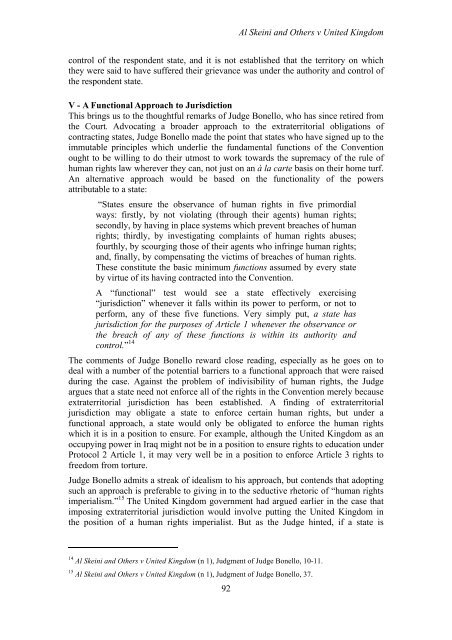Open UKLSR Volume 1(2) - Uklsa
Open UKLSR Volume 1(2) - Uklsa
Open UKLSR Volume 1(2) - Uklsa
Create successful ePaper yourself
Turn your PDF publications into a flip-book with our unique Google optimized e-Paper software.
92<br />
Al Skeini and Others v United Kingdom<br />
control of the respondent state, and it is not established that the territory on which<br />
they were said to have suffered their grievance was under the authority and control of<br />
the respondent state.<br />
V - A Functional Approach to Jurisdiction<br />
This brings us to the thoughtful remarks of Judge Bonello, who has since retired from<br />
the Court. Advocating a broader approach to the extraterritorial obligations of<br />
contracting states, Judge Bonello made the point that states who have signed up to the<br />
immutable principles which underlie the fundamental functions of the Convention<br />
ought to be willing to do their utmost to work towards the supremacy of the rule of<br />
human rights law wherever they can, not just on an à la carte basis on their home turf.<br />
An alternative approach would be based on the functionality of the powers<br />
attributable to a state:<br />
“States ensure the observance of human rights in five primordial<br />
ways: firstly, by not violating (through their agents) human rights;<br />
secondly, by having in place systems which prevent breaches of human<br />
rights; thirdly, by investigating complaints of human rights abuses;<br />
fourthly, by scourging those of their agents who infringe human rights;<br />
and, finally, by compensating the victims of breaches of human rights.<br />
These constitute the basic minimum functions assumed by every state<br />
by virtue of its having contracted into the Convention.<br />
A “functional” test would see a state effectively exercising<br />
“jurisdiction” whenever it falls within its power to perform, or not to<br />
perform, any of these five functions. Very simply put, a state has<br />
jurisdiction for the purposes of Article 1 whenever the observance or<br />
the breach of any of these functions is within its authority and<br />
control.” 14<br />
The comments of Judge Bonello reward close reading, especially as he goes on to<br />
deal with a number of the potential barriers to a functional approach that were raised<br />
during the case. Against the problem of indivisibility of human rights, the Judge<br />
argues that a state need not enforce all of the rights in the Convention merely because<br />
extraterritorial jurisdiction has been established. A finding of extraterritorial<br />
jurisdiction may obligate a state to enforce certain human rights, but under a<br />
functional approach, a state would only be obligated to enforce the human rights<br />
which it is in a position to ensure. For example, although the United Kingdom as an<br />
occupying power in Iraq might not be in a position to ensure rights to education under<br />
Protocol 2 Article 1, it may very well be in a position to enforce Article 3 rights to<br />
freedom from torture.<br />
Judge Bonello admits a streak of idealism to his approach, but contends that adopting<br />
such an approach is preferable to giving in to the seductive rhetoric of “human rights<br />
imperialism.” 15 The United Kingdom government had argued earlier in the case that<br />
imposing extraterritorial jurisdiction would involve putting the United Kingdom in<br />
the position of a human rights imperialist. But as the Judge hinted, if a state is<br />
14 Al Skeini and Others v United Kingdom (n 1), Judgment of Judge Bonello, 10-11.<br />
15 Al Skeini and Others v United Kingdom (n 1), Judgment of Judge Bonello, 37.


